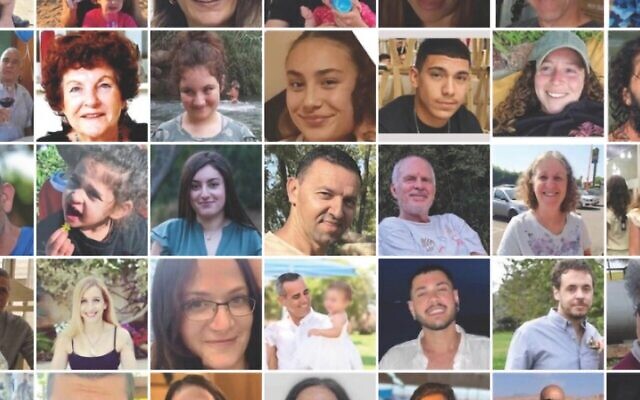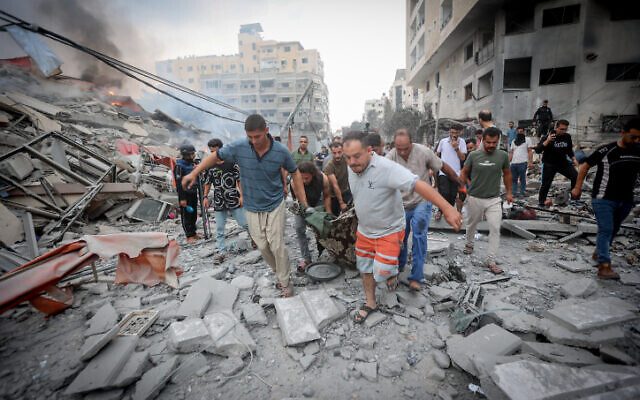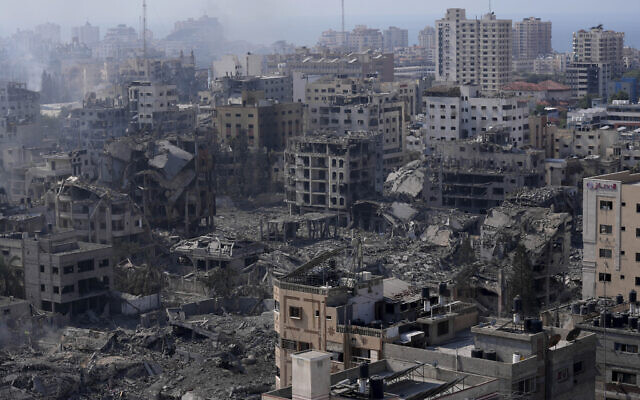As Israel’s operation to eliminate Hamas and its military threat to the State of Israel continues into its third week, voices of criticism from the United Nations, human rights groups, and numerous other parties against the IDF’s campaign have inevitably grown louder.
The IDF has said its bombing campaign, launched after Hamas terrorists slaughtered over 1,400 people in southern Israel on October 7, has targeted, and killed, Hamas commanders and gunmen, as well as destroyed weapons warehouses, command and control centers, tunnels and numerous other assets that enable the terror organization to function.
But Hamas is deeply embedded in Gaza’s civilian infrastructure, a situation that creates severe complications for the IDF.
Alongside the blows dealt to Hamas, the army operation, dubbed Swords of Iron, has resulted in heavy casualties in Gaza, reportedly including large numbers of civilians. It has done severe damage to civilian infrastructure, with some neighborhoods undergoing catastrophic destruction.
The questions as to whether the Israeli army is acting lawfully will therefore continue to surface, and with greater intensity, together with the poisonous debate this issue raises on social media, university campuses, and elsewhere across the globe. Already, violent pro-Palestinian demonstrations have occurred in some countries alongside a spike in global antisemitism.
Determining whether the laws of armed conflict are being honored or violated while a war is raging, and when information about the circumstances of IDF strikes cannot be obtained, is incredibly difficult.
First, a few structural notes. The laws of armed conflict, also known as international humanitarian law, are governed primarily by the Geneva Conventions of 1949 and their additional protocols, including Protocol I which sets out the laws governing the protection of civilians, as well as customary international law.
Israel, along with all other states, is a party to the Geneva Conventions. The International Committee of the Red Cross (ICRC), which provides protection to noncombatants under the terms of the Geneva Conventions, lists “Palestine” as a signatory party as well, meaning that both sides to this war are bound by the laws of armed conflict.
The International Criminal Court based in the Hague can prosecute serious violations of the Geneva Conventions that amount to war crimes, based on complaints submitted by international organizations, individuals, or parties to the court. The court itself can initiate examinations and investigations into possible violations of the laws of armed conflict.
The Palestinian Authority accepted the jurisdiction of the International Criminal Court (ICC) in 2015, although Israel has not ratified the Rome Statute which established the ICC. Israel has, however, responded to allegations of war crimes submitted to the court by the Palestinian Authority against it.
Understanding the IDF’s codes of practice, the steps it takes to avoid civilian casualties, and circumstantial evidence from the war can paint a general picture as to the legality of the Israeli army’s operations.
A democracy, governed by the rule of law
Israel declared war in response to the early morning October 7 invasion by Hamas terrorists in which they broke through the border fence under cover of thousands of rockets fired at Israel and rampaged murderously through southern communities, killing some 1,400 people, mostly civilians, and taking over 220 hostages into Gaza.
Entire families in their homes were among the victims, some of whom were burnt alive. Rapes, torture and other mutilations accompanied the slaughter. Some 260 people were mown down with gunfire and grenades at an outdoor music festival.
According to unverified numbers from the Hamas-run health ministry in Gaza, believed to include its own terrorists, over 5,000 Palestinians have been killed in Israel Defense Forces attacks since Israel began bombarding the Strip ahead of an expected ground offensive, with the declared aim of toppling and eradicating the terror group that rules the Strip.

Screenshot of Hamas bodycam footage as terrorists approach an Israeli vehicle during the terror organization’s October 7 attack in southern Israel, released by the IDF and GPO. (Screenshot)
One crucial factor in understanding the overall legal context of the IDF’s operations is that Israel is a democratic country, meaning it is governed by the rule of law and its army’s campaigns are ultimately subject to review by Israeli courts.
Operations are conducted upon the direction of the government, specifically the security cabinet, and are overseen by the justice system, including the attorney general and the IDF’s military advocate general. All the IDF’s operations are governed by international law, and IDF orders include a requirement to abide by the Geneva Conventions.
As laid out on the IDF’s official website (Hebrew) and supported by comments made on background by experts in the field, the IDF itself provides its soldiers and commanders with education and training in international law through the Military Advocate General’s Corps (MAG Corps) School of Military Law.

Composite of hostages held in Gaza by Hamas after the invasion of 2,500 terrorists on October 7, 2023, leaving 1,400 dead and some 220 taken captive. (Courtesy the Kidnapped From Israel campaign website/ Dede Bandaid, Nitzan Mintz & Tal Huber. Designed by Shira Gershoni & Yotam Kellner)
In addition, the MAG Corps International Law Department provides the IDF with operational advice at various levels of command on international law in terms of what can and cannot be targeted, what weaponry is lawful, who may be detained, how such people can be held, and advice on humanitarian operations in the civilian population.
During times of war, the MAG Corps activates an operational law apparatus of military lawyers and lawyers in the IDF reserves who provide advice to operational forces and other units, including those in charge of humanitarian affairs.
The head of the MAG Corps, the military advocate general, is appointed by the defense minister in coordination with the IDF chief of staff but is professionally independent and subject only to the law.
The MAG Corps is subject to two levels of oversight. The first is the attorney general, who provides international law advice to the government including in times of conflict. The second is the Supreme Court, which may hear petitions against the MAG’s decisions and policies.
Allegations of violations of international law during hostilities are examined and investigated by independent military and civilian bodies, including police and prosecutors. Their decisions are also subject to review by the civil justice system and the Supreme Court.
Military targets among civilian infrastructure
Pnina Sharvit Baruch, who served as the head of the MAG International Law Department between 2003 and 2009, insists that the IDF only attacks military targets. She noted, however, that these may include residential buildings that are used by Hamas and other terror groups.

Palestinian medics treat a child injured during an Israeli airstrike in Rafah, on the southern Gaza Strip, October 13, 2023. (Abed Rahim Khatib/Flash90)
Because such buildings are being used for military purposes, they become lawful targets, says Sharvit Baruch, as laid out in treaties governing the laws of armed conflict such as Additional Protocol I Geneva Conventions and customary international law.
Hamas’s military capabilities are deeply entrenched within Gaza’s civilian infrastructure, and indeed underneath it in a vast network of tunnels, making the task of eliminating its military threat to Israel — as is Israel’s stated goal — without harming civilians extremely difficult.
Difficult, but not necessarily illegal.
The principle of proportionality: Not a numbers game
One issue of critical importance here is that of proportionality, a concept that is very often misunderstood and misconstrued in a simplistic manner by looking at Israeli casualties and damage to civilian infrastructure, and comparing them to those of the Palestinians.
Under the laws of armed conflict, an attack is considered disproportionate, and therefore illegal, “if the anticipated collateral damage to civilians and civilian objects would be excessive in relation to the military advantage expected from the attack,” says Sharvit Baruch, who now works as a researcher at the Institute for National Security Studies at Tel Aviv University.
This means that if an attack would provide the IDF with a significant military advantage, such as taking out a Hamas commander, a key weapons facility, or similar, it could be legal even if it were deemed likely to cause civilian casualties, even heavy ones.
Every individual attack has to be proportionate in this manner in order to be legal.
That said, the circumstances of a given war and the nature of the enemy has a bearing on how the concept of “military advantage” is determined, says Sharvit Baruch.
In the wake of its terror onslaught and the atrocities it committed on October 7, Hamas can justifiably be considered to be more dangerous and ruthless in terms of its paramilitary capabilities and its willingness to harm Israeli civilians and commit war crimes than it was previously thought to be.

Bodies of the victims of Hamas’s massacres in southern Israeli communities on October 7, 2023 await advanced examination for identification at the National Center of Forensic Medicine (Abu Kabir) in Jaffa, October 16, 2023. (Tomer Neuberg/Flash90)
In such a light, the military advantage of killing a Hamas operative, destroying a command and control center, or attacking other targets can be given greater weight in the proportionality equation, meaning that the legally tolerable level of harm to civilians is also higher, says Sharvit Baruch.
“In my view, even if many civilians are killed, even in an excessive manner, it is not necessarily illegal, even if it is unfortunate,” she said.
Dr. Aurel Sari, an associate professor of Public International Law at the University of Exeter in the UK, points out another crucial point, that proportionality cannot be assessed on the basis of hindsight, but must be assessed on the basis of information that was available to the military commander at the time of the attack and prior to it.
“If it turns out that your information was wrong, that a weapon malfunctioned, or other unforeseen circumstances occurred that led to higher civilian casualties than originally anticipated, that is not a violation of the law,” said Sari, who also lectures and consults on international conflict law for NATO and the US and British militaries.
He said that in general terms, “The IDF is a professional force that adheres to the law of armed conflict,” and pointed to the quality legal advice it receives through the MAG Corps to help it comply with such laws.
Ramping up the level of force
Sari did, however, express concern over some aspects of the IDF’s campaign.
“We have witnessed the very extensive destruction of residential areas in Gaza through aerial bombardment,” Sari said, although he noted that there were “undoubtedly” many “military objectives that are lawful military targets in Gaza” that the IDF may legally attack.
“However, given the sheer number of targets and the extensiveness of the destruction, questions have been raised whether all of the attacks are in fact directed against lawful military objectives. In a similar vein, there has been concern over the very high levels of incidental harm to civilians and whether this complies with the rule of proportionality,” he added.
Sari also said he believed the amount of ordinance, the pace of operations, and the number of sorties being conducted in the current campaign to be higher than in previous IDF campaigns in the Gaza Strip.
“It could be that all of this is directed against military targets and that in every case the demands of proportionality are being satisfied, but looking at the tempo of the operations, it appears difficult to sustain that.”
Sari acknowledged, however, that without access to the information possessed by the IDF and its commanders, it was impossible to know for certain.
Sharvit Baruch agreed that the IDF has increased the level of force it is using compared to previous conflicts with Hamas in Gaza, and said that “the level of destruction and the level of casualties are much higher than before.”
But she argued this was because the threat level is now much higher, contending that Hamas constitutes an existential threat to Israeli citizens in the Gaza border region and the country as a whole, especially when taken in combination with the threat posed by Hezbollah on Israel’s northern border and Iranian threats against Israel.
“Factually, Israel is operating with more force but that is because the circumstances demand it and in my view, it is legally justified to use more force because the level of the threat is so much greater.”
Similarly, in an article published on October 17, Benjamin Wittes, the editor in chief of the Lawfare publication and a senior fellow in Governance Studies at the Brookings Institution, wrote that it would be “a grave analytic and legal error to conflate an apparently large number of Palestinian civilian casualties in Gaza with war crimes.”
Wittes wrote that although some strikes “may be war crimes to the extent the civilian death was the result of intentional targeting,” other incidents in which Palestinian civilians have been killed “may reflect mere error, bad intelligence, or collateral damage permissible under the laws of war.”
On the same note, Sari said the proportionality calculation “is not a numbers game,” explaining for example that the military advantage of killing a senior Hamas commander could be deemed to justify incidental harm to a larger number of civilians than killing a Hamas foot soldier.

Ayman Nofal, commander of Hamas’s Central Gaza Brigade, who was killed in an Israeli airstrike on October 17, 2023 (Social media)
Israel’s warnings to evacuate northern Gaza
Another factor with crucial bearing on the legality of a military strike that might harm civilians is the requirement to take feasible precautions to minimize such harm, said Sharvit Baruch.
Such precautions include warning the civilian population, although there is no legal obligation to warn of every attack. In previous rounds of conflict with Hamas, the IDF has issued specific warnings of impending strikes, but in the current operation, it has abandoned this practice in favor of general warnings to civilians to leave an area.
This is another example of how the nature of the IDF’s operations is different in the current conflict from that of previous rounds of fighting.
Sharvit Baruch insisted, however, that this is lawful, and pointed to IDF claims that Hamas has stopped some residents from heeding the Israeli army’s warnings and evacuating northern Gaza, even putting up roadblocks.
For the past two weeks, the IDF has warned residents of northern Gaza, with a population of approximately 1.1 million people, to evacuate to the southern part of the territory for safety during airstrikes and the looming ground offensive.
Those warnings, however, have been heavily criticized by some, including the United Nations, Amnesty International, and the International Committee of the Red Cross.
The ICRC said the warnings were “not compatible with international humanitarian law” when taken together with Israel’s decision to drastically cut the amount of water it supplies to Gaza and prevent the transfer of essential supplies.
“When military powers order people to leave their homes, all possible measures must be taken to ensure the population has access to basic necessities like food and water and that members of the same family are not separated,” the organization said.
Amnesty International charged that the IDF statements and leaflet drops on northern Gaza “cannot be considered an effective warning” and that they “may amount to forced displacement of the civilian population, a violation of international humanitarian law.”

Palestinian families with their belongings flee following the Israeli army’s warning to leave their homes and move south before an expected ground offensive, in Gaza City on October 13, 2023. (Photo by MAHMUD HAMS / AFP)
Writing on the Articles of War website on October 15, Michael Schmitt, a professor of Public International Law at the University of Reading and a scholar at the US Military Academy at West Point, took issue with Amnesty International’s claims and said the assessments of the IDF’s warnings needed to evaluate the available options.
The alternatives are either “an urban assault into an area full of civilians” or “an evacuation into a place that is not fully prepared to accommodate them.”
Wrote Schmitt, “Regardless of the lawfulness of Israel’s siege-like actions, the simple fact is that civilians who head south will be safer.”
It was, therefore, “bewildering,” he said, “that humanitarian organizations are not encouraging the civilian population to move away from what will be a destructive and deadly urban battle.”
As to the claims of forced displacement, Schmitt noted that the ICRC’s own rules say that “displacement” is legal if the security of civilians requires evacuation, adding that “it is not only permissible to move civilians when their safety can be enhanced but also a requirement when feasible.”
Wittes likewise rejected the criticism of Israel’s warnings, saying that the IDF could not be criticized for attacking Hamas in Gaza amid the presence of hundreds of thousands of civilians and at the same time be banned from having those civilians move away to avoid harming them.
The siege of Gaza
He was critical, however, of aspects of Israel’s siege on Gaza, saying that cutting off water was “indefensible.”
Likewise, Sari said that although siege warfare is not an unlawful method of warfare as such, Israel’s decision to cut the water supply and withhold the transfer of essential items “is difficult to justify – and if it cannot be justified, it is not lawful.”
On October 9, Defense Minister Yoav Gallant declared that there would be “no electricity, no food, no fuel” going into Gaza, and Israel imposed a total siege on the territory that day. Supply of some water was restarted on October 15, while the entry into Gaza of general humanitarian aid has also begun again, albeit in a limited way.

A convoy of trucks carrying aid supplies for Gaza from Egypt waits on the main Ismailia desert road, about 300 kilometers east of the Egyptian border with the Gaza Strip, on the way to the Rafah crossing on October 16, 2023. (Khaled DESOUKI / AFP)
The war in Gaza and the operation being conducted by the IDF in the territory is highly complex in terms of the challenges facing Israel’s armed forces to eliminate Hamas’s military capabilities while avoiding harm to civilians and thereby complying with the laws of armed conflict.
There are numerous facets to the operation, each of which has its own legal obligations and concerns. Given how deeply Hamas is embedded and ensconced within Gaza’s civilian population, and given the severe threat it poses to Israeli civilians and the country’s national security as a whole, making correct decisions in every aspect of this war is very difficult.
Sari contends, though, that it Israel must try its utmost to do so in order to live up to its own values, preserve its moral legitimacy, and ultimately maintain the backing of its allies.
“Complying with international law is mandatory, but such compliance also reflects the values and principles of Israel as a democracy and distinguishes it from its adversaries,” Sari said.
“In addition, compliance with international law is also in Israel’s interest, as it will be critical to maintain the international backing it has received,” he said.
This post was originally published on this site be sure to check out more of their content.










